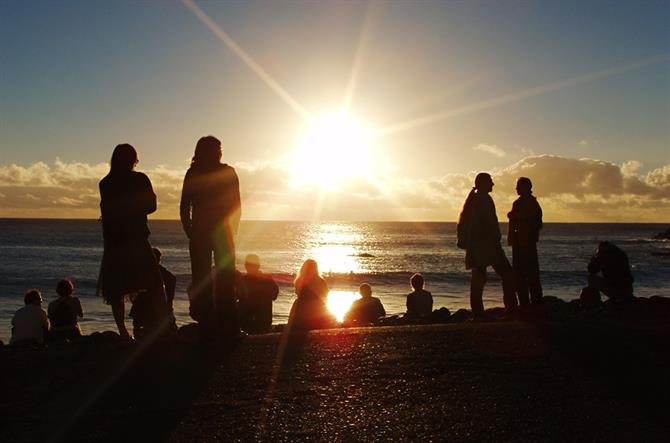

Communitarians recognise and aim to accommodate union-wide schedules that are in sync – meaning the entire local and regional unions are at work at the same time and ‘ceasing from labour’ at the same time. It is well-understood that sustaining communitarian unions, long-term, requires periods common rest and recreation, along with shared cultural activities and celebrations. It is the glue that holds the unions together.
To effect positive change in the world, communitarians understand that it is necessary to regularly come into close association with others who share the same principles and practices as well as aligned with common goals and objectives that give their lives meaning and fulfilment. We have to be seen and known to be able to create ‘life-on-life’ unity. This type of enduring unity is established by shared life experiences that are lived up close and personal; so close that we are visible and accessible to one another, so close that others can gently peel back the layers of our personal being and join us in our social, emotional and economic progress and shared contributions to the betterment of people and planet.
The objectives of the communitarian union can never be achieved by limiting our exposure to those within the union. A wide variety of context is needed for communal unions to realise the full range of their capacities to provide sustained security and satisfaction of needs that contributes to advanced quality of life, liberty and happiness, culminating in the greater good, the world over.

Evidence abounds that honouring and celebrating the ‘Day of the Sun’ in various ways has shown up in cultures across the globe spanning thousands of years. The festival of Sunday is vastly more ancient than the Christian religion. The practice of ‘celebrating the sun’ on a particular day within cycles of days to honour the gifts and attributes of the sun; namely light and life, can be traced to remote civilizations and eras that include the Canaanites, the Phoenicians, the Assyrians, the Babylonians, and other ancient civilizations throughout Egypt, India, Europe, Russia, Asia, China and the Middle East.
The influence of the sun in the religious belief of the sanctity of ‘a rest day’ that decreed the cessation of labour, also appears in Zoroastrianism, Mithraism, Roman religion, Hinduism, Buddhism, and among the Druids of England, the Aztecs of Mexico, the Incas of Peru, and Native American cultures.
In Old Russian, Sunday translates as ‘free day’, or ‘day with no work.

The human need to rest appears as a universally recognised concept across cultures and eras. “The Sabbath-rest was a Babylonian as well as a Hebrew, institution. Its origin can be traced back to pre-Semitic days, and the very name: Sabbat, by which it was known in Hebrew, was of Babylonian origin. In the Cuneiform Tablets of the Sabattu is described as a ‘day of rest for the soul,’ and in spite of the fact that the word was of genuinely Semitic origin, it was derived by the Assyrian scribes from two Sumerian or pre-Semitic words, sa and bat, which meant respectively ‘heart’ and ‘ceasing.’
The Sabbath was also known in Accadian times, as a ‘dies nefastus,’ a day on which certain work was forbidden to be done. An old list of Babylonian festivals and fast-days tells us that on the seventh, fourteenth, nineteenth, twenty-first, and twenty-eighth days each month the Sabbath-rest had to be observed” – The Higher Criticism and the Monuments, p. 74, 1895.
Throughout history assigning a day each week to participate in leisure and religious gatherings has been a common tradition that remains with us today. The mandate to ‘cease from toil’ has been handed down via a variety of cultures and religions.
In Ancient Egypt, a week ran for 10 days. From records supplied by Deir el-Medina, the village where non-slave artisans worked on the tombs in the Valley of the Kings, it was concluded that workers officially toiled for eight hours for eight days straight before resting for two days.
Traditionally, Jews observed Saturday as the day to gather at the Synagogue to celebrate their faith, culture and to study their religious laws. From the first century on, Christians came together at their Churches on Sundays. From the seventh century to modern times, Muslims close their shops and businesses and ‘cess to labour’ on Fridays in order to spend the day in fellowship and learning at the Mosques.
In imperial Rome, slaves were not allowed a day of rest. Instead, they toiled all day every day, without rest. It is for this reason their live spans were cut short. During this period, tragically, both male and female slaves rarely live beyond the age of 17. However most free artisans fared better, only working six hours a day, usually from six in the morning to midday and also enjoyed frequent days off to attend the many Roman festivals held throughout the year.
In Roman culture, Sunday was the day of the Sun god. In pagan theology, the Sun was the source of life, giving warmth and illumination to mankind. On 7 March 321AD Rome’s first Christian Emperor, Constantine I, decreed that Sunday would be observed as a day of rest. The Roman Emperor mandated; ‘On the venerable Day of the Sun, let the magistrates and people residing in cities, rest, and let all workshops be closed.’
Regulations governing activities on the Sabbath can be traced as far back as the tenth-century laws of Athelstan which imposed severe penalties on those who dared to flout the law by engaging in trade on the Lord’s Day. Nonetheless, over time, even in Christian countries, the observance of Sunday as the ‘Lord’s Day’ – a day of rest, lapsed as law and also voluntary observance by Christian Masters.
In England, since Tudor times, and continuing for four centuries, the observance of the Sabbath was strictly enjoined by Government regulation. However, it was not until the Reformation that England formally installed the fourth Commandment, ‘Remember thou the Sabbath day, to keep it Holy’, by installing Sunday as a day of ‘rest’ as a national observance by law.
In the west, before the Industrial Revolution, workers who were employed by ‘Christian Employers’ generally were allowed to ‘cease from labour’ on Sundays to attend church. In France this informal tradition was made law by several crowned kings. In 1388, Charles VI was the first to reinstall Constantine I’s decree that Sunday be observed as a day of rest, as law. In 1461 Louis IX revived the mandate after it fell by the way. Again in 1598, Henry IV saw fit to formally reinstate ‘Weekly Rest’ as law for his subjects.
However after the French Revolution, yet again, these hard-won labour laws fell by the wayside when the Napoleonic regime re-established the Gregorian calendar. For a few years, the revolutionaries implemented a new calendar in which the traditional seven-day week was replaced by ten-day week. Napoleon did away with that and returned to the standard Gregorian calendar. It was generally believed that the old tradition of using Sunday as a day of rest would resume. However, this did not eventuate due to the technological and economic demands brought about by the rise of industrialism which encouraged the majority of employers to force employees to work unceasingly, every day, without a day of rest.
It was not until 1814 that laws were introduced to make it illegal to work on Sundays and on public holidays. Still, within less than a decade and a half, these labour laws would yet again fall into disuse during the time of the July Monarchy (1830) when Catholicism ceased to be France’s official state religion.
In France, for more than two decades, the right to a weekly ‘day of rest’ was cast aside while the industrialists held free reign to exact their pound of flesh without restraint from workers, most of whom were mere children and women toiling in factories for more than 16 hours per day, 7 days a week, without end. The result, many thousands of workers were literally worked to death, being sent down to early graves by sheer exhaustion. It took many more years of violent struggles for the tables to again turn.
Once again for French workers, change was very slow in coming. In 1841, 1851, and 1892, several laws were installed instituting a mandatory day of rest for children, apprentices, and women. However, it was not until 1906 that the concept of a mandatory day of rest was expanded to include entitlements for salaried employees of commercial and industrial establishments. These long-awaited labour laws assigned Sunday as the normal day of rest.

The right to a day of rest has been hard won at the cost of many lives. In many places around the world, children and those harvesting from rubbish dumps and enslaved in domestic service, remain forced to toil 7 days a week without ‘rest’ just to survive. Communitarians celebrate Sundays as a living commemoration of the struggle for justice and worker conditions by the multitude of courageous souls who have paved the way for the legacy of ‘lives worth living’ that communitarians sustain and progress still further.
In solidarity across the globe, communitarians are proactive in advancing the cause of the attainment of living wages, safe working conditions and reasonable work hours, along with humane physical and mental work demands, for all. Beyond that agenda, communitarians carry forward the objective to raise worker ownership and participation in ethical and environmentally safe, responsible and sustainably productive ‘common wealth’ enterprises that sustain a quality-of-life befitting the value of people and planet.
Communitarians understand that they must be ‘ahead’ of themselves in actual vision to bring to fruition a significant advancement in the conditions of the workplace together with fair remuneration and worker entitlements to the point where ‘work’ becomes the true instrument of evolving perpetual peace and ‘common wealth’ secure prosperity for all.
It is for this reason Communitarian Unions utilize the Sunday Gatherings to discuss and plan for the ‘common wealth’ production systems to be installed across the globe as the norm, rather than the exception within both urban and rural areas. Presentations on subjects such as organic agriculture, natural health, natural fibre clothing manufacture, sustainable green building and retrofitting, environmental recreation and renewable energy production, are regular features of the Celebration of Sunday programs.
Sundays are also the day communitarians reach out to immigrant and marginalized workers, extending the hand of friendship and inclusion through hosting a free lunch and leisure activities. Sundays provide an opportunity to strengthen relationships and offer support to workers facing issues of overwork, unsafe working conditions, unfair wages, piece rates, inadequate accommodation, isolation, migration application rejection and vulnerability to sexual harassment and assault as well as racism and bullying.

The Sunday gatherings provide the opportunity for a full day of sincere heartfelt conscious connecting filled with warm embraces and affection. A day of holding dear our fellow communitarians and holding them in demonstrated physical esteem. Being grateful for each other’s presence, contribution, continuance, life, love and devotion of energy and intelligence, along with gratitude for the group striving toward conscious evolvement.
Human beings are relational beings. Without close intimate supportive relationships with a diverse range of people, we suffer. Increasingly people are disengaging from relational intimacy as they become more and more distracted and absorbed in a virtual world through their devices, interacting only within cyberspace. Within mainstream society, this disengagement from reality, from up-close and personal relating, spreads its cancer, eroding families and friendships that are needed to sustain us and the planet. It is common nowadays for families and couples in restaurants and cafes to be sitting at the same table, sharing a meal, and yet everyone is interacting through their phones with other people and forums while ignoring the people right in front of them. Throughout the meal not a word is spoken beyond ‘pass the salt.’
This escaping from ‘the real deal’ in front of us – people, places, sights, sounds and smells, has become an accepted norm. Few people call it out for what it is, which is ‘bad manners’ and worst still, a decline in the will and want to provide and accept real intimacy. Evidence abounds that populations across the globe are forgetting how to be relational, and along with it, forgetting what it means to be human.
The impact of this ‘disappearing’, of not being ‘present’ in our own lives – in our relationships, in our communities, is disastrous. When we are starved of human interaction – conversation, affection, social stimulation and inclusion as well as recognised and valued by the larger context of local, regional and global alliance and community participation as well as interaction, we became alienated. Social estrangement, more often than not, recognised or not, results in mental health decline. Both depression and anxiety disorders can have dire consequences, setting the stage for substance abuse, self-harm and even suicide.
Communitarian Union gatherings stand as a beacon lighting the path toward returning to ‘social reality’ that includes abundant opportunity for real connected social intimacy. The Celebration of Sunday gatherings are open to the public providing the setting and instruments to call people back to themselves, to each other, to real participation in community that includes interaction and experiences of warm affection and supportive and stimulating relating.

Sunday is a day for union, commonality, joining and study of communitarian and socialist history. The Celebration of Sunday gatherings are concrete events that carry forward the counter-cultural revolution begun in the 60’s and 70’s which impacted major parts of the globe. This period was marked by the rise of the civil rights movement, animal liberation campaigns, antiwar protests and the exposure of war-mongering and corruption amongst corporations and top-level government officials.
These platforms of activism continue today. The Celebration of Sunday gatherings are important meeting points that provide education and stimulus to the communitarian unions across the globe carrying forward the legacy of peace activism, health education, promoting the right to life and liberty of animals, resolving the root causes of child and juvenile labour and sexual exploitation by progressing the ‘Right Livelihood’ common wealth eco-collaborative projects.
The Sunday study groups are centred on raising awareness of the origins of conflicts and upheavals that affect every part of society culminating in unnecessary and easily-remedied basic food, housing and income insecurity for billions of people across the globe. These insecurities result in continual revolts against corrupt political, economic, sexist, racist and defunct religious, as well as, educational disparity, norms, bringing nothing more or less than the destruction of infrastructures of domestic habitat for people and animals as well as the destruction of the means of producing the components necessary to support stable societies.
The Celebration of Sundays Gatherings are important events that supply the canvas to construct group devised societal narratives based on ideas and experiences of alternative paths to achieve fairness, equal opportunity, environmental respect, conservation and integration with living systems that support life, liberty and happiness for all humankind as well as all creatures great and small.
Sunday is chosen as a day of solidarity – a time to come together to intelligently evolve beyond the primitive concept of subordination to masters and mistresses, whether they be of supernatural or of earthly origin. For this reason, communitarians come together on Sundays to study ethics and values, along with philosophy and cultural art spanning both modern and ancient eras. Sunday is a day for recognising and rooting out the manufacture of ‘right to rule’, ‘right to dominate’ and ‘right to exploit people, children, animals and the earth itself’.
Communitarians recognise that societies across the globe need new forms of cultural expression, born of new codes of ethics based on evolved principles and practices of peace, equality, shared resources and birthright access to all that is necessary to sustain life and liberty. Sundays are a day to come together to develop the principles and practice of true LIBERTY – the deliverance from the evils of slavery in all its forms: domestic, sexual, economic, political and religious.
There is light at the end of the tunnel. New generations across the globe are intelligently and actively rising – leading the way to reforming the long-entrenched sexist, class and separatist mentality.

Across the globe, communitarians are bucking the trend of isolationism and virtual friendships. We often hear people lamenting the now common practice of eating family meals in front of the television. On Sundays, communitarians gather for a communal celebration, forsaking not the opportunity to create and share a feast of living foods, while offering friendship and hospitality to the wider community in which we dwell.
To be a communitarian means to love people, to love them on a deeply personal and compassionate level. To do that we must be prepared to be physically close together, to love intimacy and be able to create and share it with others.
While we have many hands at the wheel driving the creation and collection of material and featured articles defining the principles and practices of Communitarian Union to make available online, our website and social media presence is of secondary importance to the visible presence and active participation and contribution within communities worldwide. The Celebration of Sunday gatherings which include a communal meal, lectures and study groups, nature excursions and associated festivities, provide a valuable opportunity to showcase the principles and practices of active communitarian union to those who might otherwise not be exposed to this way of life.
Finally, our physical gatherings provide opportunities to contribute to the growth of the communal unions. It is a time to build one another up through the gift of hospitality, song and dance and music and drama that brings joy along with a sense of belonging to a movement for change that is bigger than ourselves.